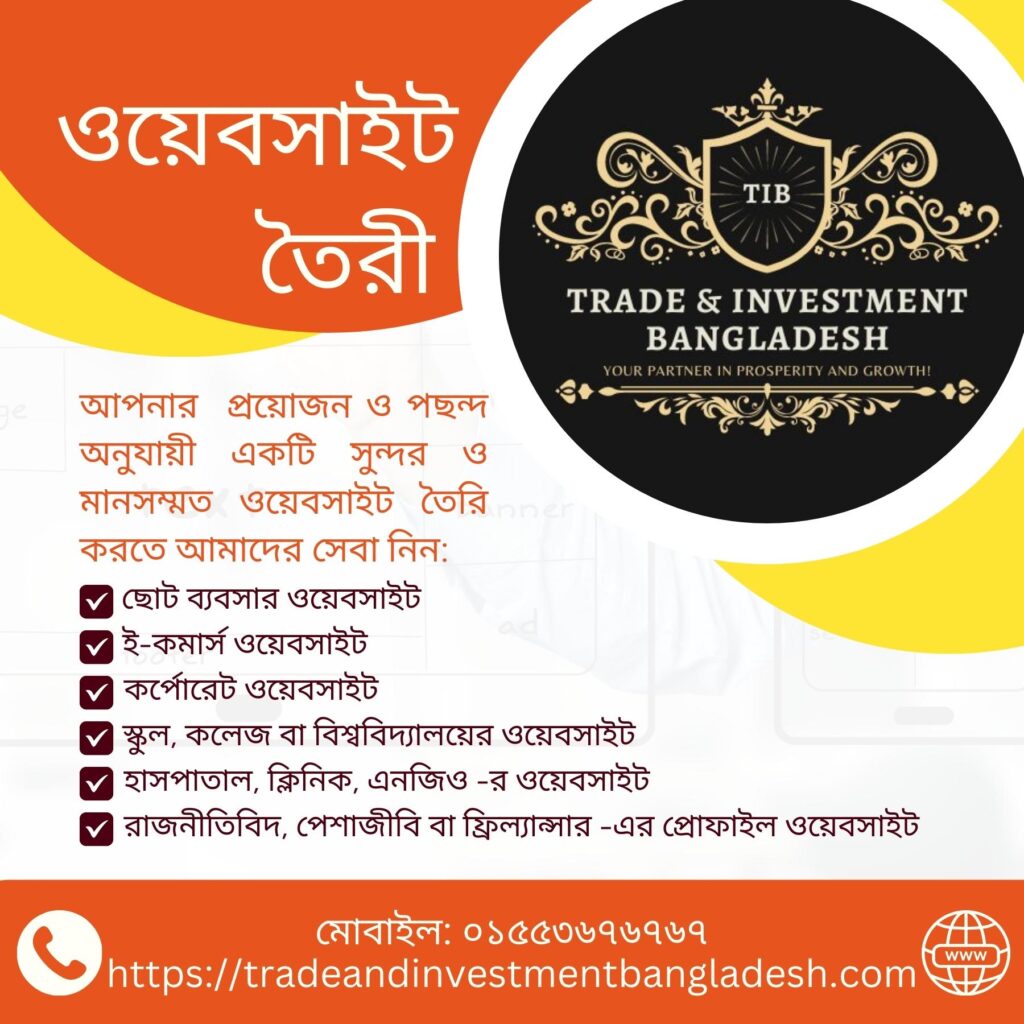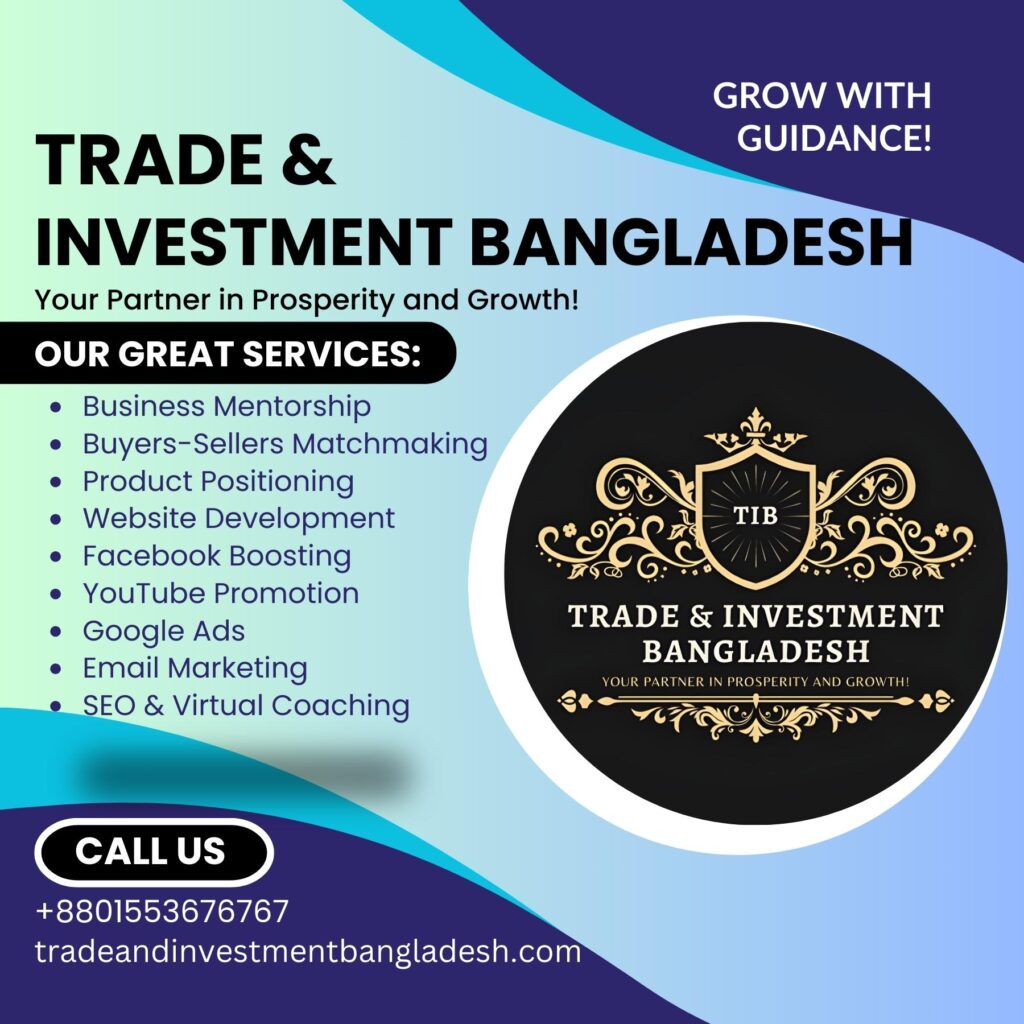
Branding Materials for a Small Business
Branding Materials for a Small Business
Md. Joynal Abdin, BBA (Hons.), MBA
Founder & CEO, Trade & Investment Bangladesh
In the dynamic landscape of small businesses, establishing a distinctive brand identity is paramount to success. As the marketplace becomes increasingly saturated with diverse offerings, creating a lasting impression on your target audience is not just a choice; it’s a necessity. This is where the role of branding materials comes into play, serving as the visual and tangible elements that encapsulate the essence of your business.
At its core, branding materials encompass a range of assets that collectively communicate your brand’s personality, values, and unique selling propositions. These materials go beyond just a logo; they include business cards, letterheads, packaging, brochures, and even digital elements like social media graphics and website design. Together, they form a cohesive visual language that resonates with your audience and distinguishes your business from competitors.
One of the primary functions of branding materials is to create a memorable and recognizable brand image. Think of iconic logos like the golden arches of McDonald’s or the swoosh of Nike; these symbols are instantly associated with their respective brands. Similarly, your logo, color scheme, and overall design elements should be carefully curated to leave a lasting imprint on the minds of your customers. Consistency across all materials is key, as it builds trust and fosters brand recall.
Moreover, branding materials serve as powerful tools for storytelling. Through thoughtful design and messaging, you can convey the story behind your business, its values, and the unique solutions it offers. This narrative connection goes beyond mere transactions, forging emotional bonds with customers and engendering brand loyalty.
In the digital age, where the first point of contact often occurs online, a visually appealing and professional brand presence is non-negotiable. Whether a potential customer stumbles upon your website or comes across your social media profiles, the branding materials should convey professionalism and credibility. This not only instills confidence in your offerings but also contributes to the overall user experience.
In essence, the world of small businesses is a competitive arena, and standing out is imperative. Effective branding materials are the building blocks of a robust brand identity, encapsulating the essence of your business and leaving an indelible mark on the hearts and minds of your audience. As you embark on the journey of entrepreneurship, investing in thoughtful and cohesive branding materials is an investment in the long-term success and recognition of your small business.
Branding Materials:
Creating branding materials for a small business is crucial for establishing a strong and consistent brand identity. Here are some essential branding materials you might consider:
- Logo: Design a unique and memorable logo that represents your brand. Ensure it is scalable and works well in different sizes and formats.

- Business Cards: Create professional business cards with your logo, business name, contact information, and any relevant social media handles. Keep the design consistent with your overall brand.
- Letterhead: Develop a letterhead for official documents and communications. Include your logo, business name, and other key details.
- Email Signature: Design a professional email signature that includes your logo, name, position, and contact information. This helps maintain a consistent brand image in your email communications.
- Brochures and Flyers: Produce informative brochures or flyers that showcase your products or services. Use your brand colors, fonts, and imagery to maintain consistency.
- Website: Ensure your website design aligns with your brand. Use consistent colors, fonts, and imagery. Include your logo prominently on the website.
- Social Media Profiles: Customize your social media profiles with your logo, brand colors, and a brief but compelling description of your business. Maintain a consistent posting style and content strategy.
- Packaging: If applicable, design packaging that reflects your brand identity. Consistent packaging contributes to brand recognition.
- Uniforms or Dress Code: If your business involves in-person interactions, consider creating a dress code or uniforms that align with your brand colors and style.
- Signage: Design storefront signage or any other physical signage that represents your brand. Ensure it is easily readable and in line with your overall brand aesthetic.
- Advertisements: Whether online or offline, design advertisements that maintain your brand’s visual identity. Consistency is key for brand recognition.
- Promotional Materials: Create promotional materials such as banners, posters, or promotional products (like pens or stickers) that align with your brand.

- Vehicle Graphics: If your business involves vehicles, consider designing graphics that showcase your brand. This is especially relevant for delivery services or businesses with a fleet of vehicles.
- PowerPoint/Keynote Templates: Design templates for presentations that incorporate your brand colors, fonts, and logo. This ensures a cohesive look for all your business presentations.
- Merchandise: If feasible, consider creating branded merchandise such as T-shirts, hats, or mugs. This can serve as both a promotional tool and an additional revenue stream.
Remember, consistency is key across all these materials to build a strong and recognizable brand. It helps create a cohesive and professional image for your small business.
Branding Materials for E-Commerce:
In the realm of e-commerce, where the digital landscape is bustling with competition, the significance of effective branding materials cannot be overstated. Crafting a compelling online presence goes beyond the functionality of a website; it involves curating a cohesive and visually appealing brand identity that resonates with your target audience. Here’s an exploration of the key branding materials essential for success in the world of e-commerce:
- Logo Design: The logo is the visual cornerstone of your e-commerce brand. It should be distinctive, memorable, and reflective of your brand’s personality. Whether displayed on your website, social media profiles, or packaging, a well-designed logo creates instant recognition and builds brand recall.
- Website Design and User Interface: Your e-commerce website is the virtual storefront of your business. The design, layout, and overall user interface should align with your brand identity. Consistent use of colors, fonts, and imagery across the site fosters a seamless and immersive brand experience, instilling trust and confidence in visitors.
- Product Photography and Imagery: High-quality and consistent product images are paramount in the e-commerce realm. Your product photos should not only showcase the features but also convey the overall aesthetic and brand image. A uniform style in imagery contributes to a cohesive brand presentation across all product pages.
- Packaging Design: While physical packaging might seem secondary in an online environment, it is a crucial aspect of the unboxing experience. Thoughtful and branded packaging design enhances the overall customer experience, creating a moment of delight and reinforcing your brand in the customer’s mind.
- Social Media Graphics: Social media is a powerful tool for e-commerce marketing. Consistent branding across platforms, including Facebook, Instagram, and Twitter, reinforces your brand identity. Custom graphics, cover photos, and promotional posts should align with your brand’s visual language, creating a unified online presence.
- Email Marketing Templates: Email remains a key channel for customer communication in e-commerce. Branded email templates not only maintain consistency but also enhance the professional image of your business. From order confirmations to promotional newsletters, every communication should carry your brand’s visual signature.
- Branded Content: Content is king in the digital realm. Whether it’s blog posts, product descriptions, or video content, ensure that your brand voice is consistent and aligns with your overall branding. This not only establishes your expertise but also contributes to a cohesive brand narrative.
- Digital Advertisements: When running digital ads, maintain a consistent look and feel with your branding materials. This includes ad creatives, banners, and any visuals associated with your online advertising efforts. A unified visual identity helps in creating a seamless customer journey from ad to purchase.

- Customer Reviews and Testimonials Design: Leverage positive customer reviews and testimonials as part of your branding. Design graphics that showcase snippets of customer feedback in a visually appealing way. This not only builds credibility but also serves as social proof of your product or service quality.
- Mobile App Design (if applicable): If your e-commerce business has a mobile app, ensure that the design aligns with your overall brand identity. Consistency in visuals and user experience across both web and mobile platforms enhances brand recognition and user trust.
In the dynamic and visually-driven world of e-commerce, effective branding materials create a cohesive and memorable brand presence. From the first click on your website to the arrival of a carefully packaged product, every interaction should reflect the essence of your brand, fostering trust and loyalty among your online audience.
Why Branding Materials are Important?
Branding materials play a pivotal role in promoting a small business, serving as the visual and tangible elements that communicate the essence of the brand to the target audience. In a crowded marketplace where competition is fierce, establishing a strong and distinctive brand identity is essential for standing out and making a lasting impression. Here’s an exploration of why branding materials are crucial for promoting small businesses:
- First Impressions Matter:
In many cases, the first interaction a potential customer has with a business is through its branding materials. Whether it’s a business card, a website, or a social media profile, these materials create the first impression. A well-designed and cohesive brand identity communicates professionalism, reliability, and attention to detail, setting the stage for a positive customer experience.
- Brand Recognition:
Consistent branding materials contribute to brand recognition. When customers can easily identify your brand through its logo, color scheme, and design elements, it fosters trust and familiarity. Over time, this recognition becomes a valuable asset, leading to increased customer loyalty and repeat business.
- Establishing Credibility:
Professional and well-crafted branding materials contribute to the credibility of a small business. Customers are more likely to trust a business that invests in its visual identity, as it conveys a commitment to quality and attention to the customer experience. Credibility is a key factor in attracting and retaining customers, especially in competitive markets.
- Creating a Unique Identity:
Small businesses often face the challenge of differentiation in a market crowded with similar offerings. Strong branding materials help create a unique identity that sets a business apart from its competitors. This distinctiveness can be achieved through a combination of logo design, color schemes, typography, and other visual elements that reflect the personality and values of the business.
- Facilitating Emotional Connections:
Effective branding materials go beyond just showcasing products or services; they tell a story. By conveying the values, mission, and personality of the business, these materials create emotional connections with customers. When consumers feel a personal connection to a brand, they are more likely to become loyal customers and brand advocates.
- Consistency Across Platforms:
In today’s digital age, small businesses interact with customers across various platforms, from physical storefronts to websites and social media. Consistency in branding materials ensures a unified and coherent brand presence across these platforms. This consistency reinforces the brand message and contributes to a seamless and positive customer experience.
- Supporting Marketing Efforts:
Effective branding materials act as powerful tools in marketing efforts. From business cards distributed at networking events to brochures detailing products and services, these materials become tangible representations of your marketing message. They serve as ambassadors for your brand, conveying your value proposition even when you’re not directly present.
- Adaptability and Scalability:
As small businesses grow, their branding materials can adapt and scale accordingly. A well-established brand identity provides a foundation that can be built upon as the business expands. Whether opening new locations, launching new products, or entering new markets, consistent branding materials ensure a cohesive and recognizable presence.
In conclusion, the importance of branding materials for promoting a small business cannot be overstated. These materials are the visual storytellers that convey the essence of a brand, create memorable impressions, and build the foundation for lasting relationships with customers. By investing in thoughtful and cohesive branding, small businesses can navigate the competitive landscape with confidence, leaving a lasting imprint on their target audience.

Closing remarks:
In the intricate dance of commerce, where first impressions linger and loyalty is forged, the significance of branding materials for small businesses cannot be overstated. As we navigate the dynamic landscape of entrepreneurship, these materials emerge as the unsung heroes, weaving together the threads of identity, credibility, and recognition.
In closing, let us reflect on the enduring impact of a well-crafted brand identity. Through meticulously designed logos, harmonious color palettes, and compelling messaging, small businesses have the power to transcend the ordinary. They transform from mere entities into memorable personalities that resonate with their audience, creating a tapestry of emotions and connections.
Branding materials are the silent ambassadors that speak on behalf of a business when words may fail. They encapsulate the spirit of a brand, distilling it into tangible elements that customers can see, touch, and remember. In a world saturated with choices, these materials serve as beacons, guiding customers through the sea of options and inviting them to embark on a journey with a brand that feels like a trusted companion.
As small businesses aspire to carve their niche in the market, they find in branding materials not just tools of promotion, but instruments of differentiation. The unique visual language they create becomes a signature, a stamp of authenticity that sets one business apart from another. In this era of digital interactions and fleeting attention spans, a well-defined brand identity becomes the anchor that holds the attention of a discerning audience.
Let us recognize the adaptability of branding materials, evolving with the growth of a small business. From the early days of a modest storefront to the expansion into new markets and the introduction of innovative products, these materials flex and scale, ensuring that the brand essence remains intact. They are the companions on the entrepreneurial journey, growing and evolving alongside the business they represent.
In essence, the story of a small business is intricately woven into its branding materials. It’s a narrative told through the elegant strokes of a logo, the vibrant hues of a marketing brochure, and the seamless design of a user-friendly website. As we bid farewell, let us carry forth the understanding that behind every successful small business, there lies a thoughtfully crafted brand identity – a visual symphony that resonates with the hearts and minds of its audience, leaving an indelible mark on the canvas of commerce.
Branding Materials for a Small Business: Branding Materials for a Small Business

Mr. Md. Joynal Abdin is a Business Consultant & Digital Marketer based in Dhaka, Bangladesh. He is Founder & CEO of Trade & Investment Bangladesh, one of the leading Business Consultancy Firm in Bangladesh. He is also Co-Founder & CEO of Bangladesh Trade Center. Previously he served at Dhaka Chamber of Commerce & Industry (DCCI) as Executive Secretary; DCCI Business Institute (DBI) as Executive Director; SME Foundation as Deputy Manager; and the Federation of Bangladesh Chambers of Commerce & Industry (FBCCI) as Assistant Secretary.
The list of services Mr. Abdin is offering includes but not limited to Business Mentorship, Business Research and Documentations like Feasibility Study, Project Proposal Preparation, Writing Business Manual, Standard Operating Procedures etc.; Export Market Selection and Product Positioning at Home and Abroad; Buyers-Sellers Matchmaking; Website Development; Search Engine Optimization (SEO); and Social Media Marketing etc.
